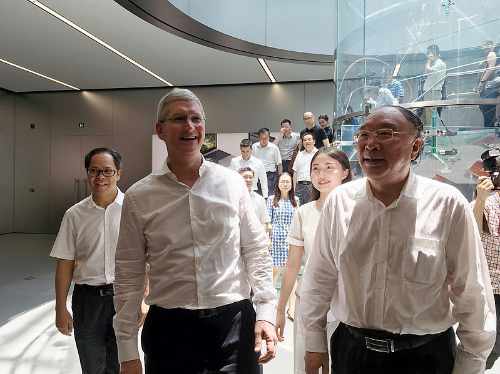



by David Reavill
On June 12, 1987, President Ronald Reagan delivered what was destined to become his most important speech. In it, Reagan called out General Secretary Michael Gorbachev personally: “Mr. Gorbachev, tear down this Wall.” He was speaking, of course, of the Berlin Wall. A Wall that had separated West Berlin from East, as the Soviet Union, after World War II, had blockaded the people of East Germany from the rest of the world.
To the absolute astonishment of everyone, that’s just what Mr. Gorbachev did. Just 2 ½ years later, the Berlin Wall fell, and just two years after that, on December 26, 1991, the Soviet Union was no more. It was one of history’s most incredible transitions of power and authority. That it was done peacefully, without anyone firing a shot, is all the more astonishing.
It was left to Reagan’s successor, President George HW Bush, to preside over a suddenly “dollar-centric” world with the US Dollar firmly established as the World’s Reserve Currency. The financial world would never be the same. Suddenly international trade boomed, the opportunities for cross-border business alliances were emerging, and would become the defining strategy for the Multinational American firms of the 21st Century. Leading that list was Apple Computer. Already a dominant firm in the Personal Computer Space, Apple would introduce new products, chiefly the iPhone, and new ways of manufacturing.
By the end of the twentieth Century, a new way of doing business had emerged, representing an entirely new philosophy. For generations, American Business Moguls sought to build fully integrated businesses. Businesses that were not reliant on outside suppliers. This business organization is called “Vertical Integrated,” when a company controls its supply chain.
Today, two major oil companies in the US, Exxon Mobile and Chevron, are two examples of vertical integration. These two companies control each step in processing oil. Today they have “wild cat” crews exploring for new discoveries, then transported by pipelines, trains, ships, and trucks. Finally refined and then sold at local gas stations.
While the Vertical Integration Model has a natural advantage during unsettled times like this, when supply lines are unreliable, it also requires management expertise over various unrelated businesses while incurring high fixed expenses to maintain plant and equipment.
Because of those high fixed expenses, American businesses began to utilize a different model. “Outsourcing” became the new watchword. Automakers were among the first groups to use this new “outsourcing” model—headlights from one vendor, tailpipes from another. Advertise your specifications, and you’d have several specialty companies bidding to become your specialty provider. It was how the “supply chain” became such an essential and integral part of American Industry.
It took a couple of visionary business people, like Phil Knight at Nike and John Sculley and Steve Jobs at Apple, to take things to the next level. Why rely just on American sub-contractors? Why not go global? They reasoned they could produce their products in far-way China with modern transportation and quality controls.
For Apple, it was a relatively easy decision. After all, they already had a vendor relationship with Foxconn, known then as Hon Hai Technology Group. Over the years, Foxconn has emerged as an increasingly important subcontractor for Apple. By the beginning of the 21st Century, that relationship took a significant step higher.
In 2000 Apple gave Foxconn the principal responsibility of building the new Apple iMax Computer. Less than five years later, plans would begin to make Foxconn the chief contractor on the Apple iPhone, Apple’s premier product. This was a crucial vote of confidence in Foxconn’s ability to produce on time and to meet Apple production standards.
Today Foxconn is China’s largest private employer, with 1.9 million workers, just slightly smaller than America’s largest employer Walmart. Foxconn is now a full business partner of Apple, no longer just a subcontractor. It is almost inconceivable that Foxconn and Apple could part. Yet, that is not out of the question.
Like the rest of us, Apple Computer is subject to the policies and dictates of various governments, and the current American Government has apparently taken direct aim at China.
Most of us, myself included, failed to recognize the true nature of Joe Biden’s foreign policy. We look at the President and see an amiable, avuncular, Grandfatherly figure when there is a highly contentious, hard-bitten politician. Someone who sees a world of “us and them.” In Biden’s world, there will be only one winner, the US of A.
Just six months into his Administration, President Biden issued the “National Security Strategy,” the defining document for America’s Role in the World.
It is a common practice among Presidents early in their term to produce such a statement. Most often, it is a relatively bland recitation of the hopes and goals of the country. Usually, lots of friendly overtures toward increasing international trade and communication and a general tone of “peace on earth, goodwill toward all.”
Not Biden’s, and this should have put us all on alert. In the President’s National Security Strategy, he singles out Russia and China by name, which is unusual. Concerning China, the document reads:
“The People’s Republic of China harbors the intention and, increasingly, the capacity to reshape the international order in favor of one that tilts the global playing field to its benefit…
These competitors [Russia and China] mistakenly believe democracy is weaker than autocracy because they fail to understand that a nation’s power springs from its people…
So, the United States will continue to defend democracy around the world …,” National Security Strategy, October 12, 2022, p2.
Essentially, the President is saying to China and Russia that he does not recognize their government as legitimate and that the United States, under his leadership, will be the “policeman of the world” in its defense of democracy.
It is doubtful that Beijing, our principal trading partner, received this statement well. Moreover, I doubt that either Foxconn or Apple welcomed these thoughts.
The President signed new export controls limiting high-end computer chip sales to China at nearly the same time the National Security Strategy was released. These restrictions included specific limits on Artificial Intelligence and semiconductor technologies. This a clear sign that the President was proceeding with his “get tough” with China strategy.
However, it is a policy involving both sides of the Pacific, China, and the American Semiconductor Industry. Yet there is no indication that the President consulted with American semiconductor makers or allowed for any comment from the American side. Instead, he went directly for the headlines directed at Xi Jinping and the Chinese leaders.
Finally, there are bizarre instances where on three occasions, President Biden proclaimed that the United States would defend Taiwan militarily if attacked by China. Most consider this a contradiction to the long-standing “One China” policy, which has been established policy for years.
These statements are just the sort of rhetorical trap a seasoned politician is expected to avoid. Yes, there is ambiguity in the One China Policy, so the prudent thing to do is avoid the issue if you can. There was absolutely no reason that Biden should have commented when he did other than to poke a finger in Beijing’s eye. That he provocatively raises this issue indicates his willingness to be confrontational.
This brinkmanship is putting the American relationship with China at risk. Today reasonable people believe that there is a genuine possibility of War between our two countries, which was unthinkable just a few months ago. We pray things don’t come to that.
However, what is apparent is that President Biden is risking the substantial trade relationships we have with China. Last week, Janet Yellen, of all people, warned of the dangers of “decoupling” our economy from China. Yellen’s comments were the first substantial olive branch to be waved by a member of the Biden Administration toward China. And it had to be a welcome overture for China’s largest employer, Foxconn, and America’s most valuable corporation, Apple Computer.
